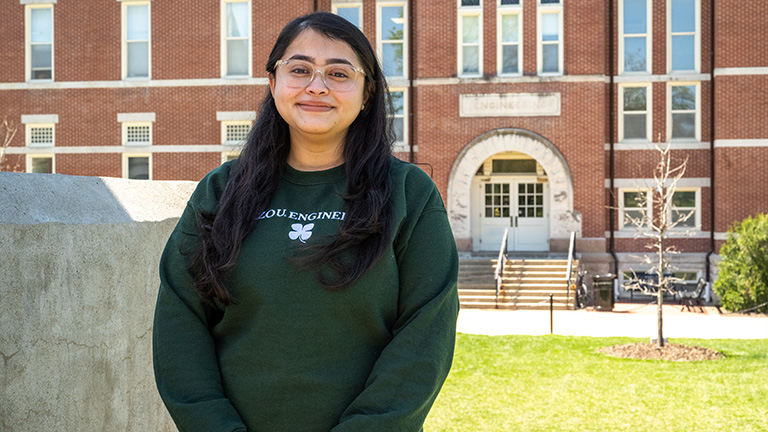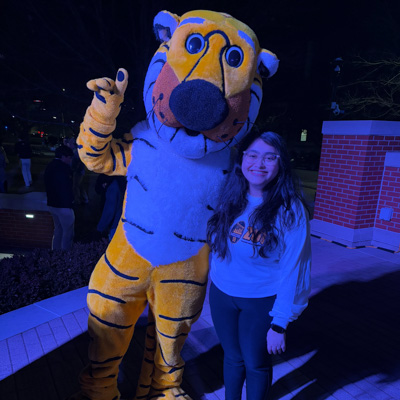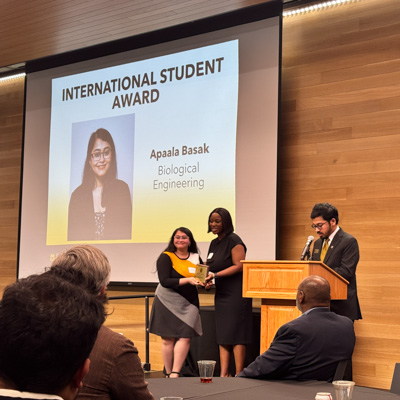April 20, 2025
Apaala Basak received the Michael Donovan NFOSD Innovation Award for her research to develop a translational approach to manage dysphagia in ALS patients using optogenetic neuromodulation.

Apaala Basak, a PhD candidate in biological engineering, is conducting life-saving research on Mizzou’s campus. She’s developing a minimally invasive solution to managing dysphagia, also known as difficulty swallowing, in amyotrophic lateral sclerosis (ALS) patients. And now she’s being recognized for her work both on campus and at the global level.
This spring, Basak received the Michael Donovan National Foundation of Swallowing Disorders (NFOSD) Innovation Award 2025, an international recognition presented at the Dysphagia Research Society (DRS) 2025 Annual Meeting. At Mizzou, she also received the Mizzou 18 Award and the Graduate Professional Council International Student Award.

“I’m honored to be recognized,” Basak said. “I think [the DRS] chose my work because of the potential impact. I’m still so early in my career — I haven’t defended yet — and the other award winners this year are all mid-career professional clinicians. I’m grateful to have my findings recognized alongside theirs.”
Harnessing light for medical breakthroughs
ALS is a neurodegenerative disease that affects the motor circuits in the brain, the central station for neural activity. Optogenetics as a neuroscience tool involves the use of light to momentarily modulate neural activity and record the neural signals in real time with millisecond-level precision.
Basak’s interdisciplinary approach is a promising solution for patients with ALS-related dysphagia who cannot undergo invasive surgery.
“Essentially, we inject a harmless virus tagged with a light-sensitive protein into a patient’s tongue that will integrate with neural membranes, making them responsive to light,” Basak said. “Then, whenever you shine a light on the tongue, the light sensitive protein will cause the tongue’s muscles to contract, thereby helping with swallowing. Our goal is to minimize deaths caused by an inability to swallow one’s own saliva.”
Post-diagnosis, ALS patients typically die within two to five years, with an eight-fold increase in deaths due to dysphagia. Current treatments are palliative, extending survival by a few months.
Basak’s treatment approach is unique and innovative because it improves swallowing outcomes while maintaining their quality of life.
“These patients already have motor deficits,” she said. “Undergoing major brain surgery and having a brain implant isn’t feasible for them. So, our goal is to develop a minimally invasive procedure. Think reducing surgery time from four to six hours down to 30 minutes. We have a strong chance of moving into clinical trials soon to begin testing on ALS patients.”
Discovering new passions
Coming into her PhD program with a master’s in applied physics, Basak has developed both engineering and neuroscience skills while conducting research toward her dissertation.

“My initial interest was in real-time imaging,” she said. “But my advisor already had a student working on that project. He suggested I look into optogenetics, which I hadn’t considered before, and I thought it sounded really interesting. Specializing in this area also provided me with an instrumentation background where I could gain expertise in multiple fields.”
Basak has worked closely with multiple faculty members, including her mentor and advisor Teresa Lever and former advisor Ilker Ozden, who is no longer at Mizzou. Shramik Sengupta, Charles Darr and Bornali Kundu serve on her dissertation committee.
“I am very grateful to my mentor and my committee members, they have all really supported me and set me up for success through every step of my journey,” she said. “They also have such varied expertise across disciplines, which is extremely helpful for my interdisciplinary research. Even though science is competitive, science is also very collaborative. You cannot cross big hurdles by yourself. You need to hold hands with other researchers and then cross them together.”
Basak has made the most of her time at Mizzou Engineering. On top of her research, she’s held leadership roles, including as the President of Missouri International Student Council and the co-founder and VP of the College of Engineering Graduate Student Association. She has also been involved in Graduate Engineering Ambassadors, Society of Women Engineers, Women in Neural Engineering and the Cultural Association of India.
She is scheduled to graduate in December and says she’s ready for the next chapter of her career as a researcher.
“If my research can save one life or improve the life of even one person, I’ll feel that I have done something worthwhile,” Basak said.
Drive life-changing research. Choose Mizzou Engineering!